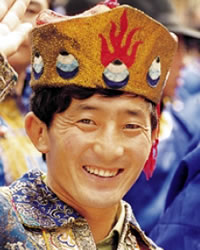Ewenki, Khamnigan in Mongolia

Photo Source:
Copyrighted © 2026
Operation China, Asia Harvest All rights reserved. Used with permission |
Send Joshua Project a map of this people group.
|
| People Name: | Ewenki, Khamnigan |
| Country: | Mongolia |
| 10/40 Window: | Yes |
| Population: | 600 |
| World Population: | 3,200 |
| Primary Language: | Mongolian, Halh |
| Primary Religion: | Buddhism |
| Christian Adherents: | 0.00 % |
| Evangelicals: | 0.00 % |
| Scripture: | Complete Bible |
| Ministry Resources: | Yes |
| Jesus Film: | Yes |
| Audio Recordings: | Yes |
| People Cluster: | Mongolian |
| Affinity Bloc: | East Asian Peoples |
| Progress Level: |
|
Introduction / History
The forefathers of the Ewenki lived in the forests north and east of Lake Baikal in Siberia and along the upper reaches of the Heilong River. They had a close relationship with the Northern Shiweis during the Northern Wei Dynasty (AD 386-534) and the Ju tribe at the time of China's Tang Dynasty (618-907). "In the mid-1600s, aggression by Tsarist Russia led the Qing government in China to move the Ewenkis to an area around the tributaries of the Nenjiang River in the Hinggan Mountains. In 1732, 1,600 Ewenki soldiers and their dependents were moved to Mongolia's Hulunbuir grasslands. The Tungus Ewenki—also known as the Khamnigan Ewenki—are one of four combined people groups who form the official Ewenki nationality in China and eastern Mongolia. Each of the four Ewenki group speaks a different language and has varying customs. One scholar describes the Tungus Ewenki language as "endangered in China and possibly extinct in Mongolia and Russia." For now, it is still spoken in the homes of Tungus Ewenki children, most of whom can also speak the local variety of Mongolian and Chinese. Though most Khamnigan Ewenki live in China, some are in eastern Mongolia.
What Are Their Lives Like?
The Tungus Ewenki live in nimor, or clans, which are groups of three to ten blood families. Some Tungus Ewenki live deep within the forests. Others have chosen to live on the grasslands where they have been influenced by Mongolian culture.
What Are Their Beliefs?
Many of the Tungus Ewenki who have experienced prolonged interaction with Mongolians have been converted to Tibetan Buddhism. The remainder practice shamanism, an ancient form of witchcraft and spiritism. Various sources agree that there are approximately 100 Ewenki Christians. The Tungus Ewenki believers are members of the Eastern Orthodox Church. However, "because of the profound influence of shamanism, they worship the statue of Jesus and other idols together. Priests of the Eastern Orthodox Church also participate in the religious activities of the Ewenkis.
What Are Their Needs?
The Tungus Ewenki in Mongolia need to submit to Jesus Christ so they can experience the abundant life he offers them in John 10:10.
Prayer Points
Pray for the Lord to provide for their physical and spiritual needs as a testimony of his power and love. Pray that the Tungus Ewenki in Mongolia will have a spiritual hunger that will open their hearts to the King of kings. Pray for workers who are driven by the love and boldness of the Holy Spirit to go to them. Pray for a movement to Christ among them to begin this decade. Source